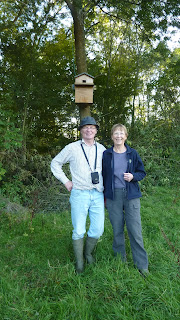Like all of us, Barn Owls need a place to call "home".
An Owl (possibly without a home)
Barn Owls normally enjoy nesting in barns. Such barns need to be sufficiently decrepit or run-down to be accessible to the homeless owl. In Sussex barns tend, of course, to be either modern and well-maintained and therefore generally unwelcoming for owls, or to have been converted into houses and therefore generally already inhabited by people.
A Barn
A good big tree with a good big and snug hole in it is a satisfactory alternative for the owl (especially as such trees make very poor barn conversions) however, these are few and far between and often beyond the means of the young Barn Owl setting out to start a family.
In short, Dear Reader(s), Barn Owls need Boxes.
The Highly Desirable Barn Owl box will have many of the following features:
Location .. location ... location ... (it will be a in a sought after neighbourhood, facing north or east with an open aspect across fields and far away from busy roads).
The box should be up a tree, at least 3 metres above the ground.
It should be warm and dry inside with a non-slip, self-draining, veranda near the main entrance from which young owls may practice their flying skills. The veranda should obviously (for Health and Safety reasons) be surrounded by a small fence so that young owls don't fall off.
I could go on.
A Highly Desirable Owl Box (note veranda)
Our Owl Box comes with two important sets of instructions, as follows:
Instructions for cleaning:
"When absolutely certain that the house is Absolutely Vacant of Nesting Owls, remove the the lower panel by undoing the two nuts and prizing it forwards evenly (a few mm at a time) using a flat screwdriver or suitable blunt blade. Crap, dead animals and other excess detritus may then be removed, taking great care not to fall off the tree, fall off the ladder, stab yourself with the screwdriver (and then fall off the ladder), drop the nuts or inhale, ingest or otherwise absorb any poisons, germs, bacteria or fungae contained within the owl box.
Replace the panel."
The removable panel with instructions to avoid confusion
Instructions to owl:
"We hope you will enjoy your stay in your new home.
If you have any queries, complaints or suggestions please don't hesitate to contact The New England Wood Trust Owl and Arboreal Dwellings Department at the address below.
After you have made yourself at home please take the following steps to preserve your species:
1. Find a mate.
2. Entice your mate back home (perhaps suggest coming inside "for a coffee").
3. Copulate.
4. Lay your eggs (indoors).
5. Keep your eggs warm by sitting on them.
6. Feed the resulting chicks diligently.
7. Teach them to fly and insist that they embark on an independent life.
8. Repeat yearly or until your new home falls off the tree."
Having built your box, it will need to be, in technical terms "stuck up a tree".
To do this, first, recruit some friends and find a big wheel barrow.
Friend, owl box and wheelbarrow.
Next, set off across the fields.
Across the fields
Stick the owl box up a tree using traditional maritime technology.
Up a tree
Make sure it is straight and level.
Your tenant owl may be unhappy if her eggs roll around inside her new home.
Is it absolutely straight?
Stand back and admire and arrange appropriate photographs.
Posing with owl box
Ready for tenants
The New England Wood Trust Owl box awaiting occupation.









